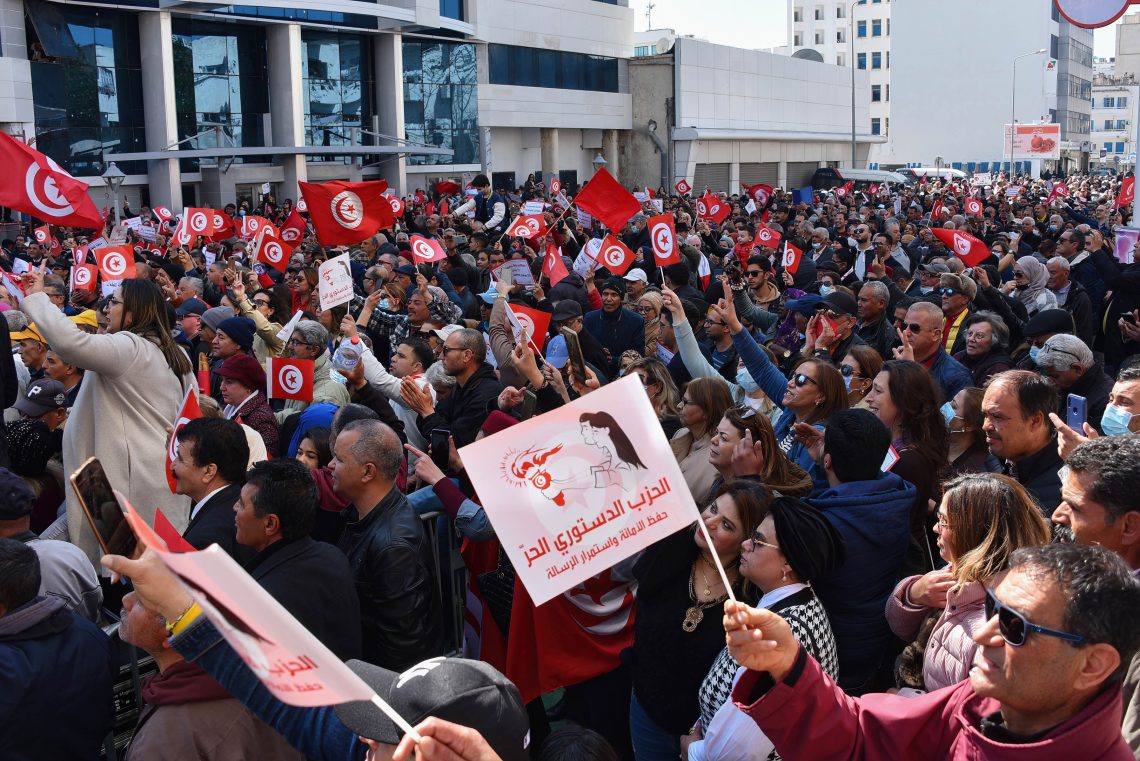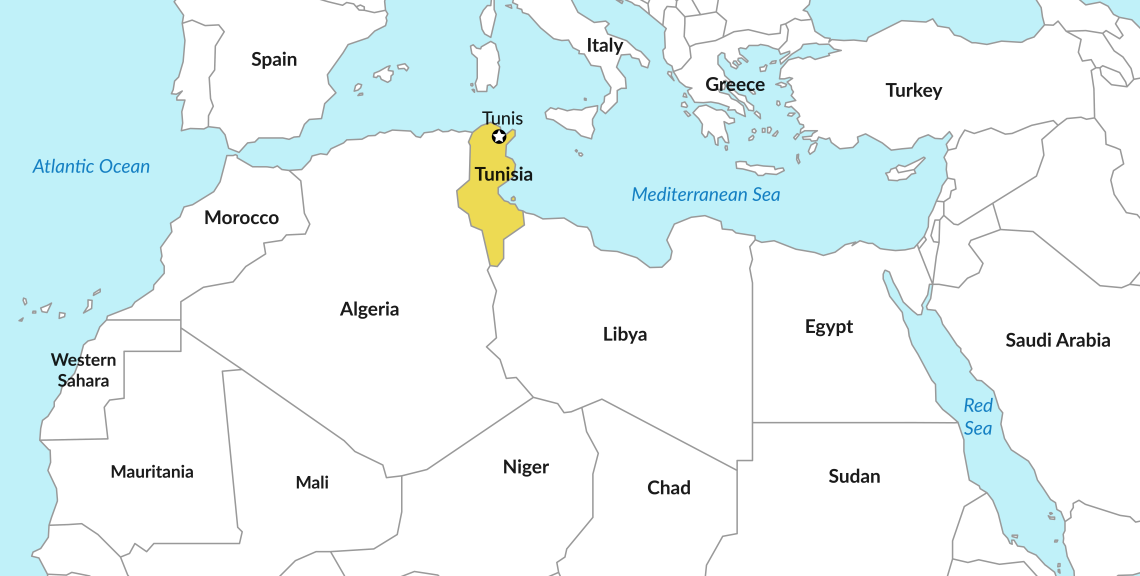Tunisia’s one-man show
After seizing power in a coup last July, President Saied faces growing discontent as the economy suffers.

In a nutshell
- Tunisia’s leader has consolidated power since a July coup
- Economic misery and social unrest are rising
- Some fear greater government repression lies ahead
A GIS report on Tunisia, published on September 2, 2021, a few weeks after the coup d’etat carried out by President Kais Saied in the nation of 12 million people, predicted he would consolidate power with the support of the army. It was defined as “the worst-case scenario,” which, unfortunately, is becoming reality with each passing day.
President Saied seized power in July 2021, dismissing the prime minister and his cabinet, erasing parliamentary immunity and ruling by decree. He imposed a one-month national curfew, to which Western democracies reacted timidly, certainly in comparison to Sudan. The only strong voice against his move came from Turkey, which described the measure – influenced by Saudi Arabia and the United Arab Emirates – as “worrisome and illegitimate.” A prominent critic, Tunisia’s exiled former president, Moncef Marzouki, was sentenced in absentia to four years in prison on charges of “assaulting state security.”
After a series of street protests in September 2021, Mr. Saied imposed a deeper crackdown with a 23-article Presidential Decree, known also as Decision 117, which effectively suspended the 2014 Constitution and granted him extraordinary powers.
In theory, the president must consult with the cabinet. In practice, this is meaningless because he picks the cabinet. President Saied’s power grab also extends to deciding citizenship rights and media freedoms. He is effectively above the law. Article 21 obliterates the interim Constitutional Court. In addition, through Article 7, presidential decrees cannot be appealed.
The one-month national curfew is still in place.
In the meantime, Tunisia’s leading Islamist political party, Ennahda, in power since the Arab Spring in 2011, has seen its membership plummet after 113 members resigned in disappointment with the lackluster response of its leader, Rached Ghannouchi, to Mr. Saied’s measures.
Meanwhile, the president’s choice of Najla Bouden Romdhane to replace Prime Minister Hichem Mechichi, sacked in July, has done nothing to dilute the one-man show, which is now reminiscent of the 30-year rule of Tunisia’s first president, the late Habib Bourguiba, who left office in 1987.
Mr. Saied, moreover, announced on December 13, 2021, that parliament may be suspended until the next elections in December 2022. In that speech, he also presented a road map for a new electoral law and constitution that will be submitted to a referendum on July 25, 2022, the anniversary of the coup. He added that, through a national public consultation process between January and March 2022, the population can offer input before the referendum.
These developments make it very difficult to assess where Tunisia is heading, because it is not yet clear how the constitution will be changed, what the electoral law will be and, finally, what kind of presidentialism the country will have.
According to some surveys carried out at the end of 2021, Mr. Saied’s support – although down from the summer of 2021, when it was around 92 percent – remains high, with 77 percent of the electorate saying they will vote for him again. These numbers underline the inherent weakness of Tunisian political parties and opposition forces.
Facts & figures
Tunisia in a troubled region

Foreign influence
Responsibility for the current situation, however, also lies abroad. In the decade since the Arab Spring, the European Union has not acted decisively to safeguard democratic progress. Compared to Eastern and Central Europe, Brussels has weakly responded to external attempts to undermine democracy in Tunisia.
As with many other African countries, foreign influence has grown and plays a leading role in domestic political choices, mainly against politicized Islam. In this regard, the Ennahda Movement’s crisis has been celebrated in Egypt, United Arab Emirates and Saudi Arabia, opening new avenues for economic collaboration. The Emirates have previously been accused of attempting to influence internal Tunisian politics against Islamist groups.
There are no good scenarios ahead, neither in the economic sphere nor possibly in the democratic one either.
The economic crisis
A major failure of President Saied’s record is the economy. Nothing has been done to reinvigorate it after a battering by violent attacks, the Covid-19 pandemic and global financial troubles.
The good news about the coronavirus is that the government, in response to deaths as high as 200 per day, intensified its vaccination campaign, raising the percentage of fully vaccinated citizens from 6 percent in mid-July to 46 percent in mid-December. At this point, more than 53.2 percent of the country’s total population is fully vaccinated. At the end of December, Mr. Saied required vaccination for all working adults and restricted travel abroad for Tunisian citizens. Faced with an external debt that in 2021 had reached 100 percent of gross domestic product, Finance Minister Sihem Boughdiri at the end of December declared he wants to rebuild state coffers through an emergency loan from the International Monetary Fund. The finances are so bad that the Tunisian government will borrow $7 billion from both foreign and domestic sources. Austerity measures are certain to follow.
One of the most pressing problems of the Tunisian economy, as in other Northern African Maghreb nations like Libya, is its bloated public employment sector. It remains a huge strain with its 700,000 civil servants, on whom the state spends 70 percent of its budget. Their number has grown continuously, doubling since the revolution, because they have been used by successive governments to appease public discontent amid flourishing corruption.
Currently, the economic news is grim, with poverty on the rise in an already poor country and unemployment is at 20 percent.
The terror threat
Tunisia remains in a formal state of emergency, nearly seven years after gunmen from the Islamic State, also known as ISIS, massacred 60 people in separate attacks.
Although jihadi attacks have diminished considerably thanks to better security, the risk of new violence remains high. Jihadist cells are still active, mainly on the border with Algeria, while the return of Tunisian foreign fighters from Syria and Iraq has been detected. The Tunisian government’s response has been repressive, but not particularly effective. The thousands of convicted jihadists imprisoned in recent years have faced torture and harsh conditions in Tunisia’s overcrowded prisons. Criminal justice reform, meanwhile, is lacking.
Scenarios
There are no good scenarios ahead, neither in the economic sphere nor possibly in the democratic one either.
“It’s going to be a very painful year,” Tarek Kahlaoui, a Tunisian political analyst, told The New York Times in a story published on January 3, 2022. “It’s going to be unpopular no matter what.”
President Saied’s consolidation of power has weakened opposition. The country is undergoing a severe economic crisis that will exacerbate social tensions, particularly if the leader doesn’t abandon his autocratic ways.
One relatively hopeful but unlikely scenario involves successful economic restructuring to attract investment and create jobs. Entrenched crony capitalism and corruption stand in the way to this path and it’s not clear whether Mr. Saied is willing or able to break the elite’s stranglehold over the economy and state bureaucracy.
Worse scenarios are possible that involve bankruptcy or a painful debt restructuring that would devalue the currency, freeze public salaries, reduce imports, lead to higher inflation and unemployment, force privatization and possibly even lead to the insolvency of public banks.
The most likely scenario, however, is no substantive change or improvement. This prospect will further polarize society, fueling political confrontation and discontent on the streets. Such dire conditions encourage extremism. Desperate young people will be encouraged to join ISIS or flee for better lives. Powerful security forces will be under greater pressure to prevent social collapse and their consent will be required for President Saied to remain in power.





